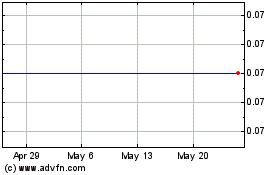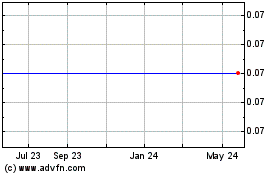ATLANTA, GA , a pharmaceutical company focused on the treatment
of chronic inflammatory diseases, today announced top-line results
from its ANDES Phase 3 clinical trial of AGI-1067 (succinobucol)
for the treatment of Type 2 diabetes demonstrating that both doses
(75mg and 150mg) of AGI-1067 met the primary efficacy endpoint of
the reduction in glycosylated hemoglobin (A1c) versus placebo at
the end of the study's six month dosing regimen.
"We are pleased that the ANDES trial met the primary endpoint
and showed a dose response in reducing A1c. Based on the results of
this successful trial, AtheroGenics intends to rapidly move forward
with development of AGI-1067," said Russell M. Medford, M.D.,
Ph.D., President and Chief Executive Officer of AtheroGenics. "We
believe that AGI-1067, through its unique mechanism of action,
could become the first diabetes treatment with demonstrated
cardiovascular safety, and with the potential to reduce
cardiovascular hard events including cardiovascular death, heart
attack and stroke, as reported from the 6,144 patient Phase 3 ARISE
trial, which concluded in 2007."
ANDES, an international, double-blind trial, showed a
dose-dependent, statistically significant drop in A1c of 0.6% and
0.4% in the 150mg and 75mg arms, respectively, at 6 months,
compared to baseline (p < 0.001 for 150 mg versus placebo, p =
0.016 for 75 mg versus placebo). The placebo group decreased 0.2%
from baseline.
In the trial, a regional variation was observed in the placebo
arm. Eastern Europe showed a significant decrease of 0.5% for A1c
in the placebo arm versus baseline. The other study regions showed
an increase of 0.1% in A1c in the placebo arm versus baseline.
Importantly, A1c reductions in both AGI-1067 treatment arms were
similar across all of the regions in the study. The study analysis
plan was prospectively designed to detect and analyze the effect of
regional differences. AtheroGenics will continue to analyze the
trial data, including the impact of regional differences.
Based on a preliminary review of the safety data, AGI-1067 was
well-tolerated and was not associated with weight gain or
hypoglycemia in either of the treatment groups. There was no
difference in discontinuations between the groups receiving active
drug and placebo. One patient in the 150mg arm and two patients in
the 75mg arm had unexplained liver enzyme elevations of greater
than five times the upper limit of normal. The liver enzyme
elevations either have resolved or are resolving.
The Company also announced today that it has developed a patient
identification tool to screen for the small number of patients who
are potentially at risk for adverse hepatic effects that have been
observed during treatment with AGI-1067. The tool has performed
well at identifying at-risk diabetes patients across all doses used
in the ARISE and ANDES trials.
"We are excited about the advances we have made to date with the
patient identification tool for AGI-1067," commented Alexander
Fleming, M.D., Acting Chief Medical Officer. "We plan to
incorporate this tool into the next AGI-1067 Phase 3 trial."
About ANDES
The data represent findings from a multinational, double-blind,
placebo-controlled, dose-finding study of patients with Type 2
diabetes (ages 18-75) who were on one or no other oral
anti-diabetes therapies and whose A1c level was greater than or
equal to 7.5% and less than or equal to 10.5% and completed the
study. A total of 999 patients were enrolled in the ANDES study,
including 887 in the current three-arm protocol. The trial included
approximately 150 clinical sites in the United States, South
Africa, India and Eastern Europe.
About AGI-1067
AGI-1067 is a novel oral drug candidate with demonstrated
anti-inflammatory and antioxidant properties. AGI-1067 works by
selectively inhibiting signaling pathways that are activated in
response to oxidative stress and pro-inflammatory stimuli.
Oxidative stress and inflammation have been implicated as playing a
key role in the pathogenesis of insulin resistance and
diabetes.
About Type 2 Diabetes
Diabetes (diabetes mellitus) is a chronic disease in which the
body does not produce enough insulin (insulin deficiency), or the
cells ignore the insulin (insulin resistance). Insulin is a hormone
that is needed to convert sugar and starches (carbohydrates) into
energy needed for daily life. The cause of diabetes continues to be
investigated, and both genetic and environmental factors such as
obesity and lack of exercise appear to play a role. The disease may
lead to blindness, heart disease, stroke, kidney failure,
amputations and nerve damage. Type 2 (adult onset) diabetes
accounts for approximately 90 to 95 percent of all diabetes. This
equates to roughly 221 million people with type 2 diabetes
globally, and 24 million people in the U.S. alone. The American
Diabetes Association recommends an A1c measurement of less than 7%
for most people with Type 2 diabetes. A1c is a measurement of a
person's average blood glucose level over a two-to-three month
period and is considered an important marker of long-term glucose
control.
About AtheroGenics
AtheroGenics is focused on the discovery, development and
commercialization of novel drugs for the treatment of chronic
inflammatory diseases, including diabetes and coronary heart
disease (atherosclerosis). The Company's lead antioxidant and
anti-inflammatory drug candidate, AGI-1067, is being studied for
the treatment of diabetes and has completed a Phase 3 clinical
trial known as ANDES (AGI-1067 as a Novel Anti-Diabetic Agent
Evaluation Study). In addition, the Company has other clinical and
preclinical anti-inflammatory compounds, including AGI-1096, an
oral agent for the prevention of organ transplant rejection. For
more information about AtheroGenics, please visit
http://www.atherogenics.com.
Teleconference and Webcast
AtheroGenics will host a conference call on Thursday, July 31,
2008 at 9:00 a.m. Eastern Daylight Time to discuss the top-line
results of the ANDES Phase 3 clinical trial.
Conference Call Details:
Dial-In:
(877) 407-8031 (U.S.)
(201) 689-8031 (International)
To access the conference call replay, please dial (877) 660-6853 (U.S.) or
(201) 612-7415 (International), Conference ID: 292834; Account #286. The
conference call replay will be available through August 7, 2008.
Webcast:
To access the webcast, please go to
http://www.atherogenics.com/investor/index.html.
The webcast will be available through September 1, 2008 on AtheroGenics'
website www.atherogenics.com.
Disclosure Regarding Forward-Looking Statements
Statements contained in this press release that relate to events
or developments that we expect or anticipate will occur in the
future are deemed to be forward-looking statements, and can be
identified by words such as "believes," "intends," "expects" and
similar expressions. AtheroGenics cautions investors not to place
undue reliance on the forward-looking statements contained in this
release. Examples of forward looking statements in this press
release include our expectation that we will rapidly pursue the
development of AGI-1067; AGI-1067 could become the first diabetes
treatment with demonstrated cardiovascular safety, and the
potential to reduce cardiovascular hard events including
cardiovascular death, heart attack and stroke; and the Company
plans to incorporate the patient identification tool into the next
AGI-1067 Phase 3 trial. These and other such statements are subject
to certain factors, risks and uncertainties that may cause actual
results, events and performances to differ materially from those
referred to in such statements. For example, additional information
relating to the safety, efficacy or tolerability of AGI-1067 may be
discovered upon further analysis of trial data. The U.S. Food and
Drug Administration might not allow us to conduct further studies
of the efficacy of AGI-1067 for the same or new endpoints and, to
the extent approved, additional clinical trial work may take a
significant period of time to complete or require significant
additional resources to complete. We cannot ensure that AGI-1067
will ever be approved or be proven safe and effective for use in
humans. These and other risks are discussed in AtheroGenics'
Securities and Exchange Commission filings, including, but not
limited to, the risks discussed in AtheroGenics' Annual Report on
Form 10-K for the fiscal year ended December 31, 2007 and Quarterly
Report on Form 10-Q for the quarter ended March 31, 2008, which are
specifically incorporated by reference into this press release. We
undertake no obligation to publicly update any forward-looking
statement, whether as a result of new information, future events,
or otherwise.
Atherogenics (NASDAQ:AGIX)
Historical Stock Chart
From May 2024 to Jun 2024

Atherogenics (NASDAQ:AGIX)
Historical Stock Chart
From Jun 2023 to Jun 2024
